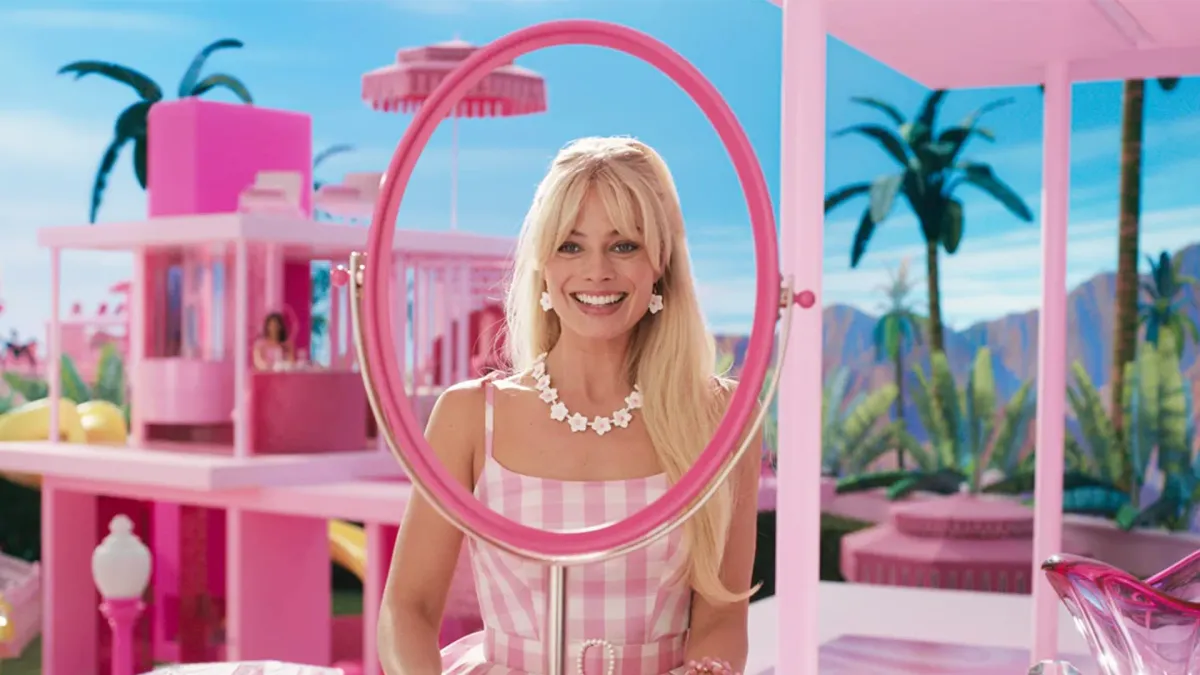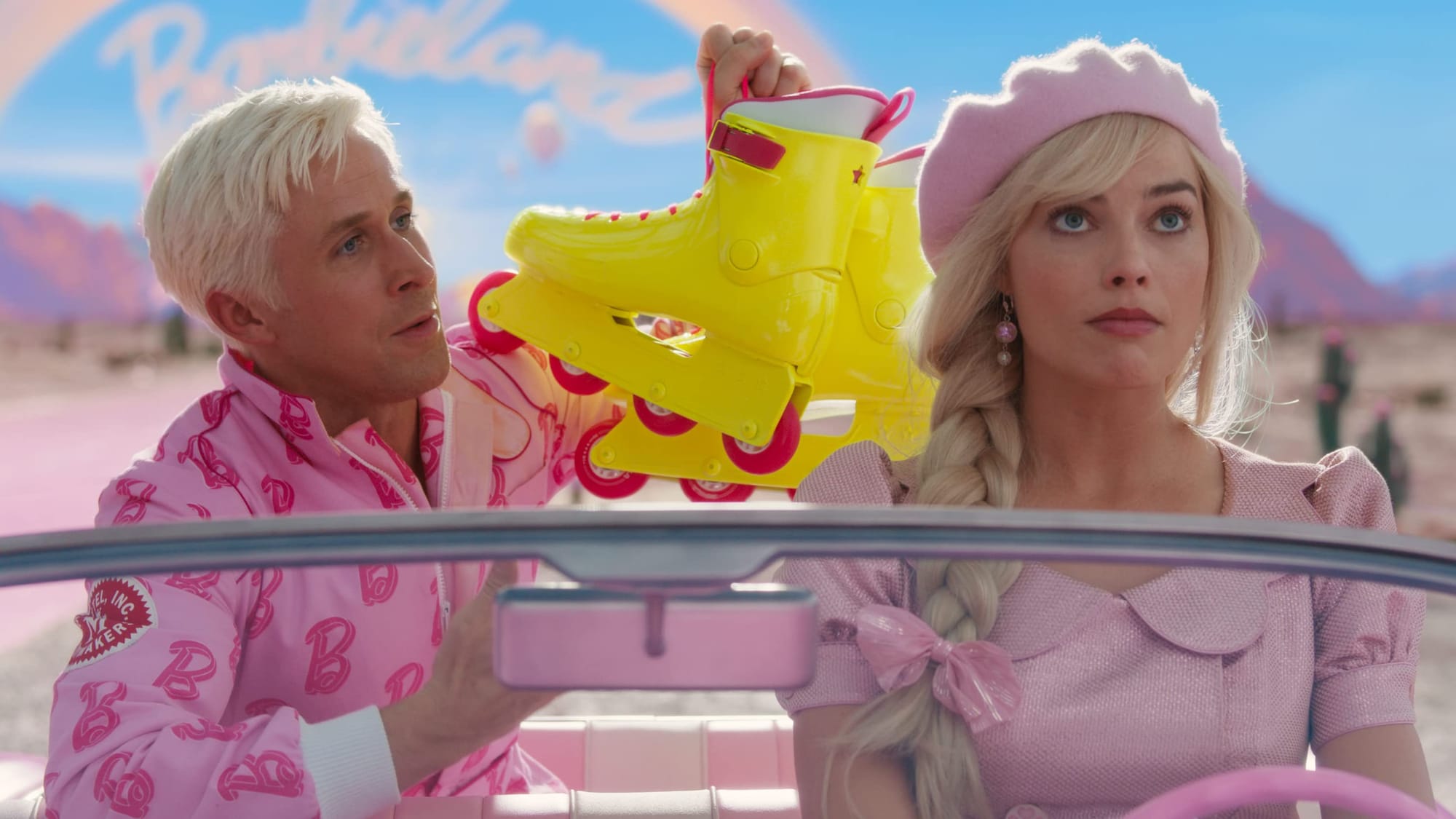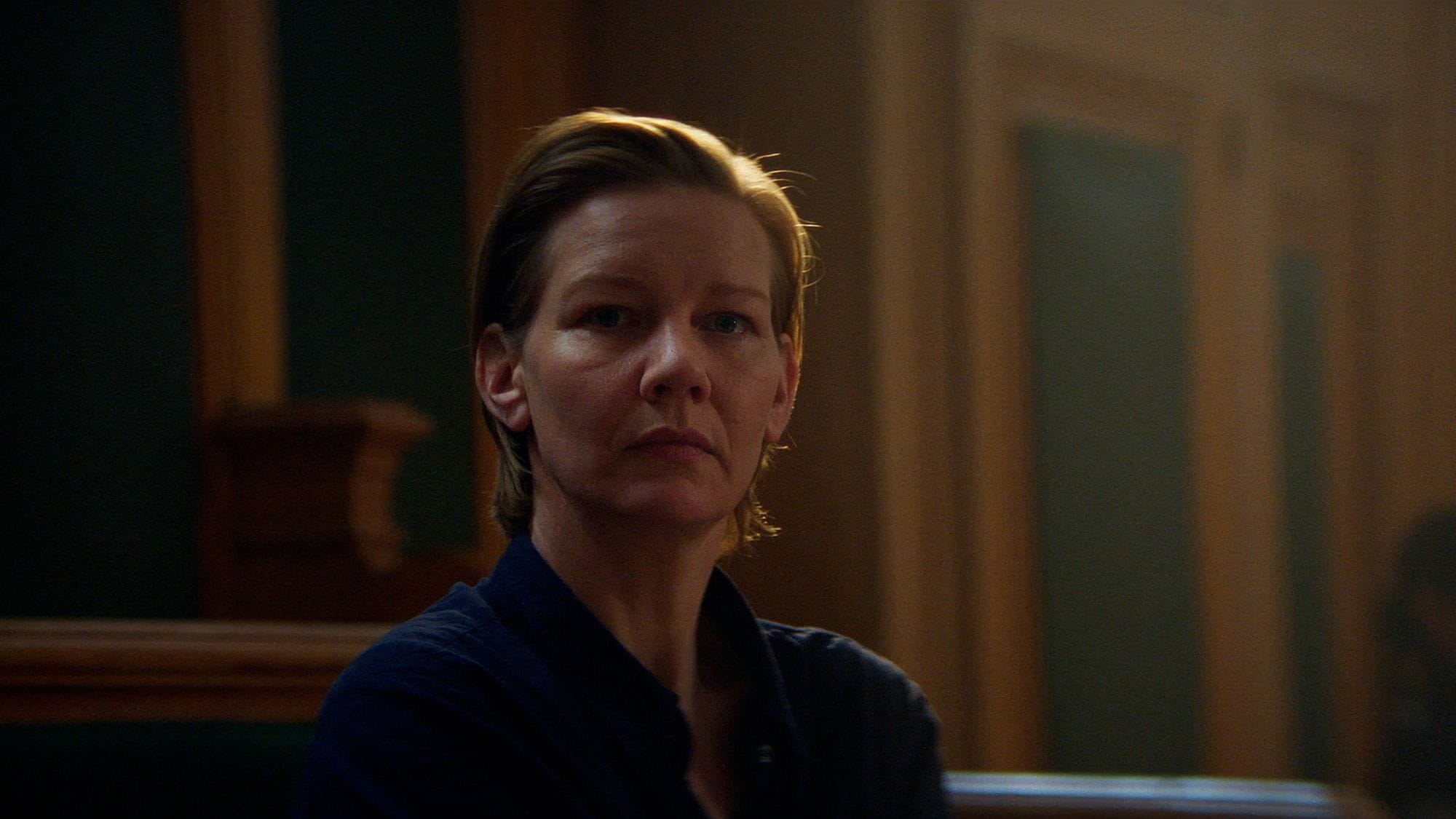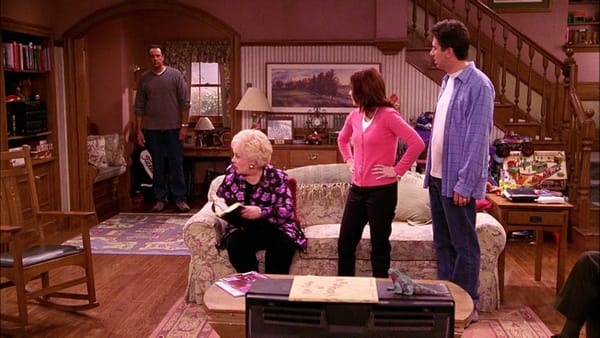Forever 2014
What we get mad about when we get mad about Barbie's Oscar snubs

Brief warning up top: This one is very long. I'm incredibly proud of it, and I hope you'll read it, but also, maybe open it in a tab somewhere. Leave it hanging out for a few days. It'll keep! –Em
At this year's Oscars, for the first time ever, three Best Picture nominees are directed by women: Anatomy of a Fall (dir: Justine Triet), Barbie (dir: Greta Gerwig), and Past Lives (dir: Celine Song). Yet only one of those women – Triet – was nominated for Best Directing. Across those 96 Oscar ceremonies, the Directing category has contained at least one woman nominee only eight times. And only once – 2021 – has the Academy's director's branch seen fit to nominate two women in the same year.
This stat is, of course, ridiculous. Within the universe of films the Academy deems "Oscar-friendly," the organization should have been able to nominate women in this category far more than nine times, and it should definitely have been able to include more than one woman on multiple occasions, right? Setting aside that this year's lineup for Directing is one of the most stacked in recent memory, I could still imagine squeezing, say, Celine Song in there for Past Lives, a film that contains both precise shot compositions and evocative performances. That kind of quietly sure-footed direction is rare in a debut feature.
Yet Song's snub is not the snub that got people up in arms over this year's Best Directing category, nor do people seem particularly worked up about the Academy's spotty history of nominating women in this category. No, people are furious that Gerwig was snubbed.
To be clear, the Gerwig snub was a real one. She was nominated at most major precursors and received a nomination from the Directors Guild of America. If you are furious on a gut level that Greta Gerwig didn't receive a Directing nomination, know that her own guild at least abstractly agrees with you.
But ask yourself this: If Gerwig were nominated in place of Justine Triet, would anyone be nearly as mad that the category only found room for one woman?
Or how about this: If Celine Song were nominated alongside Justine Triet in Best Directing, would people still be furious Greta Gerwig wasn't nominated?
What if we extend a hypothetical directing lineup to five non-men who directed amazing movies in 2023 (Triet; Song; Kelly Freamon Craig for Are You There God? It's Me, Margaret; A.V. Rockwell for A Thousand and One; and Emma Seligman for Bottoms)? Would the Gerwig snub still be all anyone noticed?
In 2023, global superstar Taylor Swift started dating Kansas City Chiefs tight end Travis Kelce. Kelce is a player well-known enough that when I heard she was dating him, I said, "Oh, sure, that guy," but still anonymous enough to non-NFL fans that it took me until very recently to realize his brother, Jason, is also a professional football player.
As a consequence of this relationship, Swift started showing up at football games, first attending a Sept. 24 game against the Bears. Swift has achieved levels of fame so stratospheric that she can't really do anything normally anymore, but being a sports girlfriend seems to be about as close to normal as she can get at present. She hangs out with her boyfriend's family! She goes swag surfin'! She eats something that is "seemingly ranch"!
The range of reactions to this relationship span the entire spectrum from "kinda over-the-top" to "aggressively horrifying," which is par for the course for all reactions to anything Taylor Swift does. Yet many of them have a certain... tenor to them, something along the lines of "Get that woman off my TV during my football games!" If you spend any time around people who care a lot about football, the idea that Swift is distracting from THE GAME is everywhere.
Maybe that was true those first few games she attended! Certainly when her relationship with Kelce was merely rumored, coverage of her attending his games was pretty omnipresent. As their relationship has become less novel, however, her presence at games has ceased to be much of a factor within their broadcasts. In the recently played AFC Championship Game, for instance, shots of Swift in the stands took up under 45 seconds of screentime in a three-hour broadcast. Is that more than most players' partners? Probably? Is it that much in the grand scheme of things? Not at all.
If I were to look for the note behind the note of "Stop showing Taylor Swift! I want to watch football!" I might note that Swift's mere presence at these games has substantially boosted viewership among women. Surely, some of those women are watching on their own, but plenty must be watching along with the men in their lives, turning what has traditionally been framed as a space for "the guys" into a space women can enter, too.
From the NFL's perspective, this is great. More potential consumers, more! Yet when you look at it from the perspective of a guy yelling to get Taylor off the TV – well, who do you think he's really yelling at? Taylor? The NFL? Broadcast television networks? Or someone closer to home?
Consider becoming a paid subscriber: For as little as $5 a month, you can support this newsletter and help keep it rolling. Paid subscribers get a weekly post on Fridays, access to comments, access to my Andor recaps, and a link to the Episodes Discord server. There will be some other fun treats along the way. Click the button to learn more!

From the moment its release date was announced, Barbie rarely existed as a solo cultural object. It was largely seen as one half of Barbenheimer. Once a critical mass of cinephiles realized Barbie and Christopher Nolan's Oppenheimer were coming out on the same day and seemingly targeting vastly different audiences, the idea of seeing both in the same day became something you just had to do. Whether you loved both movies, hated both movies, or didn't even see both movies, you were at least vaguely aware of Barbenheimer in the way you are surely at least vaguely aware Taylor Swift is dating a football player. It was a rare pop culture monolith in a world of ever-splintering subcultures.
On the flipside of the Barbenheimer fun, however, was that the accidental mash-up moment surely resulted from a crass calculation made by two movie studios: Barbie and Oppenheimer could open opposite each other because they surely couldn't be targeting the same audience, right? One movie's for girls (ew!), and one movie's for boys (gross!). Surely.
We live in 2024, where we realize this fundamental business logic proved incorrect. Both films were massive successes, among the top five films of the year at the box office. Both films are Best Picture nominees and seem likely to win some of those awards. If you love the movies, you had to see both films to be able to have conversations about the Year in Cinema 2023.
Yet that incorrect business logic has continued to dictate many of the kneejerk reactions to Barbie, even after it became by far the biggest film of the year at the box office and received eight Oscar nominations. To dismiss Barbie even slightly is often seen as somehow dismissing womankind or the feminist project or the cultural value of femininity.
That Gerwig and star Margot Robbie were snubbed of nominations for Directing and Best Actress where Ryan Gosling was nominated for Best Supporting Actor has become, somehow, a story about how the Academy didn't understand the film's extremely obvious and not at all subtextual feminist critique. "Of course they nominated the man from Barbie" makes sense as a kneejerk reaction, but it falls apart the second you realize that the Academy nominated a slew of women who worked on Barbie, including both Robbie (in Picture) and Gerwig (in Screenplay).
Known woman America Ferrera received the film's other acting nomination, presumably bolstered by a speech about how hard it is to be a woman that the Max YouTube account dubs "iconic." Do nominations for songwriter Billie Eilish, costume designer Jacqueline Durran, or production designers Katie Spencer and Sarah Greenwood not count on some level? Is it not at all impressive that Gerwig's first three solo directorial outings were nominated for Best Picture? Why all the anger on behalf of two white, blonde, presumably cishet ladies?
I mean... I can guess.
I'm not an idiot. I understand that the ire directed at the Oscars here is driven as much by how the Academy tends to devalue comedy and blockbusters as it is by how the Academy tends to devalue films aimed at women. I understand that the "real" issue (if it can be called an issue) is that, like, Oppenheimer got 13 nominations and is probably going to win Best Picture while Barbie got "only" eight. I know why we're mad. I do!
I even share in that anger somewhat. Gerwig wouldn't make my personal five best directors list (though Triet and Song would), but I tend to believe if a movie is both critically beloved and a box office hit, the Oscars should probably shower that movie in nominations. As such, I find the Gerwig snub very strange. The Oscars needed Gerwig more than she needs the Oscars. But I don't find the snub surprising either. Director is an especially tough category this year! So is Best Actress! Great films by and about women are getting made and nominated for awards, so many of them that they occasionally crowd out a massive blockbuster like Barbie! We should be happy about this, right?
Right?!
The last time Taylor Swift came close to being as popular as she is right now was almost exactly 10 years ago, when she released 1989 in late 2014. That album, with its massive hits ("Shake It Off," "Blank Space," "Style," etc.) and even more massive stadium tour, pushed Swift to levels of fame she simply could not sustain. After a series of unfortunate run-ins with the Kardashians and a case of severe overexposure tanked her reputation in the public eye, Swift went into hiding for a while and emerged with her most divisive album, whose theme is, basically, "How can you love me if I am a garbage demon?" (Tay, go to therapy!)
Swift's 2014 wave crest also coincided with growing public awareness of the idea of "poptimism," which is essentially the idea that it's okay to enjoy popular things like pop music and that those art forms often have levels of craft that explain their extreme popularity. The term had been around for a while before 2014, but a huffy column in the New York Times by critic Saul Austerlitz both brought it into the mainstream and made it seem like the cool new thing, as opposed to the shitty, sniffy rockist dads who had dominated music criticism to that point.
Perhaps the foremost beneficiary of poptimism curiosity was Swift. It's easy to see why. Even critics who don't particularly like her will admit she's a top-notch songwriter, and she's also a beautiful, white, blonde lady who was reaching the then-zenith of her fame precisely at a time when discourse around an incredibly white varietal of white feminism was at the core of tons of pop culture discussion. In 2014, Not All Men and mansplaining and manspreading entered the cultural lexicon. (All terms existed before 2014, but 2014 is when they take off in terms of search and social notice.) It's the year of endless Twitter debates about pop culture through a feminist lens defined largely by surface-level understanding of Tumblr tags. And it's the year of True Detective, in some ways the straw that broke the camel's back of TV shows about tortured white guy protagonists. I had just started working as the Culture Editor at Vox, and posts about all of these topics routinely rode high on Chartbeat. To write about the world through a pop feminist lens was a gateway to lots of attention in 2014.
In some respects, Swift was a right-place, right-time kind of figure for a growing sense that white women could also make great art and it might not always look like the kinds of art white guys made, yeah. (The author humbly submits this piece by herself as Exhibit A.) Swift cannily rode those currents, surrounding herself with a girl squad of extremely attractive, mostly white women and speaking up about feminist causes mostly through the lens of how they directly intersected with the life of Taylor Swift. She was 23! I would have done the same!
Yet it's also plausible that Swift read tea leaves settling in the culture in the way seemingly only she can. After her 2012 release Red was largely defined by rumors about the men she'd based various songs on, the lead-off single for 1989, "Shake It Off," was all about how she was learning to stop letting gossip get to her and finding way to just go have some fun. It was not obviously about a guy in any way. It was a celebration of being young and beautiful and fun-loving, and it came out on August 19, 2014, exactly at the right point in the calendar to capitalize on all of the trends discussed above.
And just three days before that, a software engineer posted a lengthy screed about his ex to his blog. She designed video games, and the ensuing firestorm of sexist harassment that followed came to be known as Gamergate. When you think about the decade since 2014, does it feel defined more by poptimism or by Gamergate? I know my answer.
Shortly after the release of Barbie, much of the right-wing media ecosystem became obsessed with talking about how the movie was bad and hated men. Ben Shapiro made a 43-minute video detailing all of the problems he found in it, in minute detail. Oh, well, the weird internet guys consoled themselves. Barbie had gone woke, so yea, surely it would go broke. When that didn't happen, the dudes mostly shut up. But for about two weeks there, Barbie was all they were talking about.
On the other side of the discourse line, lots of folks argued over whether the film was feminist enough, if its status as a de facto toy commercial undercut everything it was going for. I found some of these discussions worthwhile, and I even contributed to the conversation myself. But, I also wondered: Are we really still having these conversations?
Naturally, I made a tweet about it.

Barbie is a very good movie that made me laugh a lot, but what's most interesting to me is how the higher-level discourse around the movie's feminism didn't seem at all connected to how mass audiences consumed the film. That disconnect between the critical conversation and the audience's response is not unique to this film and, indeed, exists for almost every film. Yet in the case of Barbie, the disconnect seems at times as though the two conversations are happening in entirely different worlds.
That disconnect is most obvious around Ferrera's big speech. Those who have critiqued the shallowness of the film's feminism usually start with said speech. Essentially every point made within it has been stated over and over again by feminist activists going back to at least the second wave, if not even further. In general, I am persuaded by this argument (though I think Ferrera's performance in the scene is wonderful).
Yet when I talk to women in my life who don't really follow online discourse, especially women a generation older than me, the speech wrecked them. They felt deeply seen by it in a way that pop culture often aspires to and rarely achieves. To a certain extent, the speech's lack of nuance was a selling point for these folks. It was like someone was finally putting words to something they'd been thinking their whole lives and had never heard put quite so well.
To be clear, I don't think the Barbie speech was the first time these women had ever encountered ideas like "It is literally impossible to be a woman." Yet what resonates isn't the words themselves but the context they exist within. The biggest movie of the year featured a speech exploring the contradictions of womanhood, in a way basically anyone could understand and appreciate, and both the speech itself and the actress delivering it have been roundly applauded. What's more, the movie containing that speech is forthrightly feminine in its presentation. It is a girl movie for girls, but it's also one of the most acclaimed films of the year and an intensely moving experience if you've spent your entire life being told girl movies for girls just don't matter in the way "real" movies do.
Similarly, you'll occasionally see (white) women talking about how Taylor Swift speaks for all womankind or something, and while they're wrong, what I think they're getting at is that Swift's music is similarly unapologetic in how it celebrates emotions and experiences our society traditionally codes as "feminine." And she's arguably the most famous person on the planet right now. Her music is so good that it transcends the stereotypes society built for it and appeals to huge amounts of the planet's population.
Of course, Swift has also come in for the ire of many of the right-wing dorks who assailed Barbie last summer. That she possesses any social or political capital at all is vaguely suspect because she is the wrong kind of blonde white lady. And in the undercurrent of every bromide against having Swift on TV during football games is driven by a similar desire to make sure the girls stay doing their girl things.
Like the Barbie speech, none of this is new. Genuinely, this is just a repetition of the sexism that undergirded Gamergate and the Trump campaign. It's the sexism that has always been with us in one form or another. As Lauren Theisen writes in a terrific piece about the Barbie "snubs" at Defector, we just keep circling the same ideas endlessly and pretending we're discovering new thoughts. It's forever 2014, but 2014 was just forever 2004, was just forever 1994, was just forever 1894, all the way down. The Barbie speech speaks to people because sometimes, you just have to acknowledge the circle you're trapped in via the plainest language you can think of.

Anatomy of a Fall, a film sometimes suspected of stealing Gerwig's directing nom, is also a not-particularly-nuanced feminist text, this one about the ways in which women's lives are wrenched away from them the second they achieve any kind of notoriety. In it, Sandra, a novelist, lays down to take a nap. When she wakes up, her husband lies dead on the ground outside their mountain chateau, seemingly having fallen from the top floor onto the hard snow below. Or that's the story Sandra tells the authorities, at least – she went to sleep, and when she woke up, her husband was dead.
Yet there are no witnesses, and there are tiny inconsistencies in Sandra's story that start to look like gaping holes the more the police probe at them. Soon, she is standing trial for the murder of her husband, and all the while, the film is trying to get you to second guess your initial suspicion, which is that there's no way Sandra could have pushed her husband out of a third-floor window to his death. I will not spoil where all of this ends up except to say that Anatomy wants you to make up your own mind in a way I found gratifying. It rarely goes in for hitting you over the head with text when subtext will do.
And yet the places where the film does hit you over the head with the text almost all stem from the ways the legal system tries to paint Sandra as a horrible person. The prosecution's case against her often seems to largely stem from her being a woman who was more successful than her husband and therefore left a lot of the childcare to him. Anatomy is making a bunch of interconnected points here about gender parity and power dynamics within couples and the role of mental health in all of our lives, but the core tension is always: Will Sandra go to jail because she is not a traditionally "sympathetic" woman?
Sandra has sharp edges. She cheated on her husband. She is not always the world's most attentive mother. She berated and belittled her husband. In one of the film's best scenes – and possibly the best scene I saw in any film last year – Sandra and her husband have a huge fight a few days before his death. The film shifts seamlessly from a recording of that fight playing in a courtroom to a depiction of that fight (though the voices are always dubbed to remind us we're listening to a recording). Yet when the fight turns violent, we switch back to the courtroom, listening to the recording. The defense argues Sandra's husband turned violent toward her; the prosecution argues it was the other way around. And we can never know who hit whom. All we have is a deeply ambiguous tape.
I preferred Anatomy of a Fall to Barbie because temperamentally, I'm predisposed to like a two-and-a-half hour French movie about how even the most successful women find themselves defined by their marriages eventually that also somehow features the best performance by a dog I've ever seen. At its core, however, Anatomy of a Fall seems to exist in that shadow 2014, that Gamergate world, one where once society decides to define a woman a certain way, no matter who she is, she cannot escape the rigidity of that definition, unless she is literally Taylor Swift. (And society keeps trying to pin her down like a specimen under glass.)
Barbie hails from poptimist planet, from another world we thought we were maybe promised but didn't ultimately get, which may be why it's ultimately such a wistful film. Yet at the core of the film's satire is the idea that in Barbie World, the gender roles of men and women have been neatly flipped. Gerwig knows that this comedic conceit is an inexact representation of gender, created for consumerist purposes (like a pink NFL jersey), and she also knowingly tweaks the limitations placed on women in our society via how the film treats the Kens.
Yet sometimes, the celebration of the idea that Barbie World is just our world, only one where the girls get to shove the boys' faces in the dirt for a while and ask how they like it, leaves me a little disquieted. It is, yes, an outgrowth of a decade that has seen everything from the unexpected loss of the first woman nominated for president by one of the two major parties to the slow-building backlash to the #MeToo movement.
Yet it's also innately tied to the idea that men and women are forever trapped in an endless, circling death spiral, twin forces that always oppose each other but never quite touch. (As a trans woman, I must strenuously object, but that's a whole other essay.) Barbie is, in this dialectic, not simply good in and of itself but good because it is not, say, Oppenheimer. And Gerwig's Directing snub underscores how you can direct the biggest film of the year and still not be nominated if that film is perceived as being "for" girls.
It feels like we're going backward, yes?
If you think back to 2014, it felt, for a bit, like something, somewhere was lurching forward. I don't want to apply rose-colored glasses to that period of time. Almost all of the social injustices we're dealing with right now were still present then – many of them far worse – and it's not as though capitalism were running any less amok at that time. But I, at least, had not quite given up on the idea that change was still possible, that a better world might be realized in my lifetime.
I haven't given up on that idea still, but it feels ever more like a mirage. At one time, it seemed like we could upend long-standing systems of oppression just enough to allow for better equity among people, while also not pissing anybody off. We now know, of course, that this was impossible, that men perceive women having a third of the dialogue in a film as women having half the dialogue in a film, etc., etc., etc. But the thing is we knew all of this in 2014, too. We have always known all of this, if only intuitively, and we (or at least I) better understand now that knowing might be half the battle, but that still leaves half a battle to be fought.
We live in that poptimist world on a pop culture level, especially if you are a white millennial woman. (It's me, hi! I'm the problem, it's me!) Barbie and the Eras Tour were perhaps the most dominant pop culture moments of 2023, and women continue to see huge successes across the pop cultural landscape. We can direct probing indictments of the legal system or swooning long-distance almost romances or candy-coated confections based on dolls, and all three can receive Best Picture nominations, dammit. Girls rule! And, as a corollary, boys drool!
Yet that world also feels built atop an increasingly shaky foundation. A person's access to an abortion in the United States varied based on the state under Roe v. Wade, but they always had the right to one. Now, that's no longer the case. The rights of trans people to live our lives as we need to are being rapidly eroded in statehouses around the country, with a hard-right Supreme Court likely to weigh in, and once our rights are dispatched with, the rights of other queer folks will be next, along with access to birth control, no-fault divorce, you name it.
It is easy to read the anger over Greta Gerwig's snub as eye-rolling at an Academy that refused to see the world for what it is. Look at it more closely, however, and it has the feeling of ferociously guarding what little territory we have left. If we yell at the Academy, after all, they might listen or Jimmy Kimmel might make a joke about the snub or something. If we yell at the forces systematically stripping away our rights, if we yell and yell and yell, if we organize to defeat them at the ballot box, if we do our damnedest to reassert the better world we believe we should live in... those forces will just keep plowing ahead.
We cannot stop them with bright, shiny, poptimist monuments to a world that evaporated before we could even begin to feel like it was promised to us. But those monuments might make us feel slightly less alone. So we close ourselves in the dark and wash ourselves in pink and hope when we emerge back into the light, everything will have changed.
This week's reading music: "What Was I Made For?" by Billie Eilish
The free edition of Episodes is published most Wednesdays, and the subscriber-supported edition of Episodes is published every Friday. It's written by Emily St. James. If you have suggested topics, please reply to the email version of this newsletter or comment (if you are a paid subscriber).




